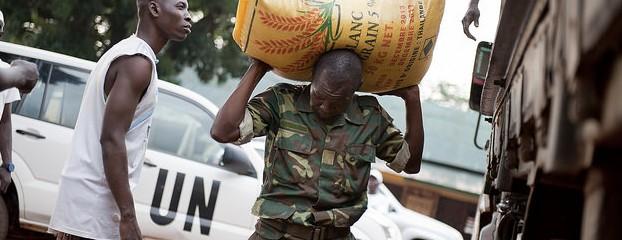China Africa News: China a force for peace in the new Sudan?
This update is published by China-Africa News
South Sudan gained its independence on the 9th of July. A week earlier
President al-Bashir of Northern Sudan was in China meeting with senior
party figures. China has been Sudan’s most valued ally over the past 5
years as Beijing has shielded the North Sudanese leadership from
criticism over conflict in Darfur, and has been a close partner in
developing the oil industry.
Despite ongoing tension between the North and the South, China has managed to
maintain a relationship with both sides. Sudanese oil is vital to
China’s strategic interests. With South Sudan holding 75% of the known
resources in the former unified Sudan, Beijing has been keen to develop a
relationship. China took in 79% of South Sudan’s total oil exports last
year.
“Although China and the Republic of South Sudan are separated by thousands of
miles, the two peoples have a deep traditional friendship and common
wish to enhance friendly exchanges,” Hu Jintao told South Sudanese
President Salva Kiir in a telephone call.
Meanwhile North Sudanese Foreign Minister Ali Ahmed Karti accompanying al-Bashir
in China said, “We are now in need of Chinese support because the West
instead of supporting us is now doing what I can describe as a
challenge”. Beijing has managed to position itself as a key ally to both
markets at the expense of Western powers. While the efforts of the ICC
in prosecuting leaders who commit war crimes are undoubtedly noble, they
have had little clear positive on influencing al-Bashir a year later.
Despite the intention to indict war criminals irrespective of nationality, it
is unlikely that the ICC will investigate calls by Human RIghts Watch to
investigate torture under the most recent Bush regime. Nor is it likely
that the US would cooperate with charges if they were levelled.
In a region scarred by continuing conflict, the dual relationship China
holds with the North and South could be a powerful force for peace.
China’s interests on both sides of the border and its power in the
affairs of both countries mean it will lobby hard for peaceful relations
between President Kir and President al-Bashir. Having worked for a long
time to build oil security through these relationships China has a very
strong interest in preventing conflict.
In interviews with official Chinese media, al-Bashir combined reassurances
about his commitment to a peaceful secession of the south, with a
warning that the division could still go wrong.
While other Western powers largely ignored the fledgling government in Juba,
China has been active in constructing government buildings, and building
relationships. The Sudanese oil resource is so important to China that
Beijing has also been engaged in a long running battle to build and
operate the planned Lamu port and infrastructure corridor through Kenya
and Uganda.
While the country has only recently gained full independence, regional and
international powers have for a long while been planning for South
Sudan’s debut. Currently all of Sudan’s oil infrastructure runs north to
refineries in Port Sudan, but understandably the South is keen to
diversify its outlets. Kenya is only too willing to oblige.
The Lamu corridor has long been mooted in order to carry Sudanese crude to a
modern port on the East African coast. The competition to build this
port has largely been between Japan and China, as investors have brought
nearly $5bn to secure infrastructure in the region. This includes an
oil refinery, a sea port and a 1,400 kilometre oil pipeline that will
link Juba to Lamu. An accompanying train line has also been discussed.
The root of the South Sudanese succession is in the country’s isolation and
sidelining, brought about by the dominant national interest in
Khartoum. Opening up an alternative trade corridor to the South will
break Juba’s reliance on the north and allow it more control over the
receipts from its oil wealth. For China, a new port at Lamu will also
avoid funneling Chinese shipping through the Gulf of Aden, while for
Kenya it will open an easy and reliable new fuel supply, and new markets
for its manufacturing industries.
There has also been a great deal of investment in the 1,130 kilometre road
that links Nairobi to Juba to cut down journey times which currently
take up to 26 hours. Business Daily quotes the combined cost of the
projects at an estimated $10 billion (Sh750 billion) or 34 per cent of
Kenya’s Sh2.2 trillion gross domestic product (GDP).
The succession of South Sudan was inevitable considering the former Sudan’s
fractious political past. While Western attempts to effect improvements
in the Sudanese situation through the ICC are worthy, China’s carefully
built trade relationships may in reality prove more effective at
maintaining peace.
Selected Headlines:






